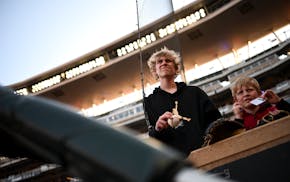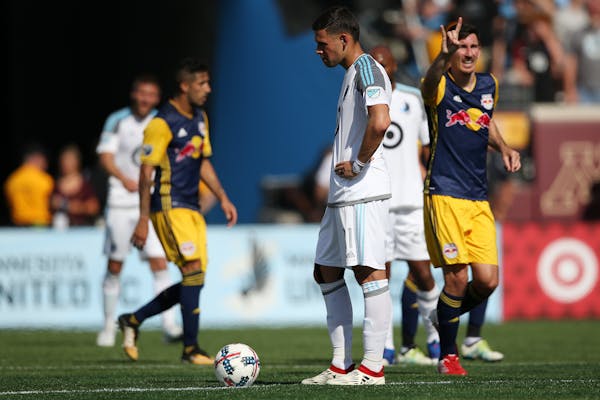On a season-ticket holder town hall teleconference Thursday morning, Minnesota United President Nick Rogers' parting remarks were a steadfast disavowal.
"The first two seasons before we get to our new stadium, we don't think that it's a soft launch in any way, shape or form," Rogers said. "But the reality is that there's a finite amount of resources that we've got to figure out to how to allocate, and we're making some big investments."
That statement pretty much sums up United's inaugural Major League Soccer season so far.
With match 22 of 34 total at 7 p.m. Saturday against D.C. United at TCF Bank Stadium, the Loons are still chasing their metaphorical feathered tails when it comes to competitiveness and relevancy. And a large reason behind that is time.
While expansion franchises rarely win right away, United opened play with embarrassing losses. The team's highest-paid player, named captain early on, struggled and now is expected to leave the team. These stumbles exemplify how United raced through December and January, finding and signing more than two dozen players and then melding them into a team under a newly hired coach all in time to face the best in American soccer starting in March.
"We've been a little bit behind the eight ball," coach Adrian Heath said. "We've been chasing, a little bit, all the way through. But we knew that was going to be the case."
United was awarded an expansion franchise back in 2015 but wasn't officially green-lighted to join the league for the 2017 season until this past Aug. 20. That gave the club about six months to hire a coach, build a roster and sell tickets. All this on top of finishing out its final North American Soccer League season by the end of October.
Compare this to fellow expansion side Atlanta United FC, which had 18 months and a vastly bigger budget to prepare a brand new team. Atlanta, in playoff contention, leads the league in attendance.
When Heath came to the Loons at the end of November, the club had only two player signings in the works. When Heath helped bring Orlando City SC from the United Soccer League to MLS in 2015, he said Orlando was "maybe three years down the road more" than United was.
"I knew the group. … I knew them inside out," Heath said of his players in Orlando. "And we had the training ground up and running. We had things. Everything was organized."
While not out of the playoff race yet, the Loons (5-12-4) are at the bottom of the Western conference and second-to-last overall in the 22-team league. Only two players who started the team's inaugural match March 3, a 5-1 loss at Portland, are still considered starters.
Five new players have joined the roster since the start of the season. Three have made their exits, and another one — former captain Vadim Demidov — is on his way out.
"It's one where we've got to be honest where we were very hopeful," sporting director Manny Lagos said of Demidov. "As a club, we felt like it wasn't worth the project to keep him here. So we're working very hard to try to see if another environment would be appropriate for him."
Demidov, a 30-year-old Norwegian center back, was supposed to be one of United's core players. He was one of three the team used targeted allocation money to sign, along with midfielder Rasmus Schuller and the new captain, center back Francisco Calvo. Demidov, United's highest-paid player at about $550,000, played only three matches, which were also United's biggest losses. Calvo is the only one of those three to have really emerged as part of the Loons' foundation now and in the future. NASL holdovers Christian Ramirez — the team's leading scorer with 10 goals — and center back Brent Kallman have also proven themselves at the top level.
Lagos said it's important to acknowledge both the hits and misses from building the roster, which he said really came together in about seven weeks after Heath's hiring. The front office has worked to correct the missteps along the way. After letting in 18 goals in four matches in a historically bad MLS start, the Loons made a transaction March 31 to obtain midfielder Sam Cronin and left back Marc Burch from the Colorado Rapids. And in this current transfer window, the depth-starved United has added a forward, midfielder and defender.
Off the pitch, United has also had some scrambles, such as figuring out where it will train. The team had to maneuver around renovations to the National Sports Center early in the season — training instead at Bielenberg Sports Center in Woodbury — and then deal with the poor condition of the outdoor stadium pitch that kept the team on turf for longer than was ideal.
Some events at the National Sports Center, such as the USA Cup youth tournament last week, have forced the Loons to find other training grounds, from TCF Bank Stadium and Elizabeth Lyle Robbie Stadium on the University of Minnesota campus to a field at the University of St. Thomas.
Businesswise, though, United's outlooks are a little brighter. Earlier this week, the club sold out its Itasca Society of 11,842 season ticketholders and is in a position to reach about 14,000 season ticketholders once new stadium Allianz Field opens for the 2019 season.
The club is projecting to sell out the lower-bowl of TCF Bank Stadium, which is about equivalent to the 19,400-capacity Allianz Field, for the last four home matches of the season.
"When I think about other ramps-ups in MLS history, most of them have been 12 to 18 months. Having six months, while executing a NASL season at the same time, and to get to the 12,000 season ticketholders, I think we're very pleased with that," said Bryant Pfeiffer, United's senior vice president for sales and strategy. "We've been constantly playing catch-up just because of the small amount of time we had, no question.
"We're basically a startup company. We're basically executing an expansion season in a professional sports league and building a stadium. Those are three massive work streams that most clubs, in any sport, have never experienced simultaneously."
Despite this first season being a massive lesson in multitasking, United FC is hesitant to use the condensed timeframe as an excuse. As Kallman put it, "I don't really like trying to find moral victories like that. Bottom line is, we feel like we have good enough players to compete and to do some things, so that's what we expect."
And 2017 might at least be a good metaphor for the Loons' still-forming identity.
"One of the things about Minnesotans and the club in general is, they pride themselves on whatever the occasion, showing up and getting the job done," midfielder Collen Warner said. "I think that's what makes this year special and this group here special."
Analysis: The IndyCar season has just started but free agency is in full swing after only 2 races

Live from Target Center: Timberwolves vs. Suns game updates

Is the east side the best side in high school baseball? Poll has an answer.
Webb Simpson offers to resign from PGA Tour board. But only if McIlroy replaces him, AP source says

